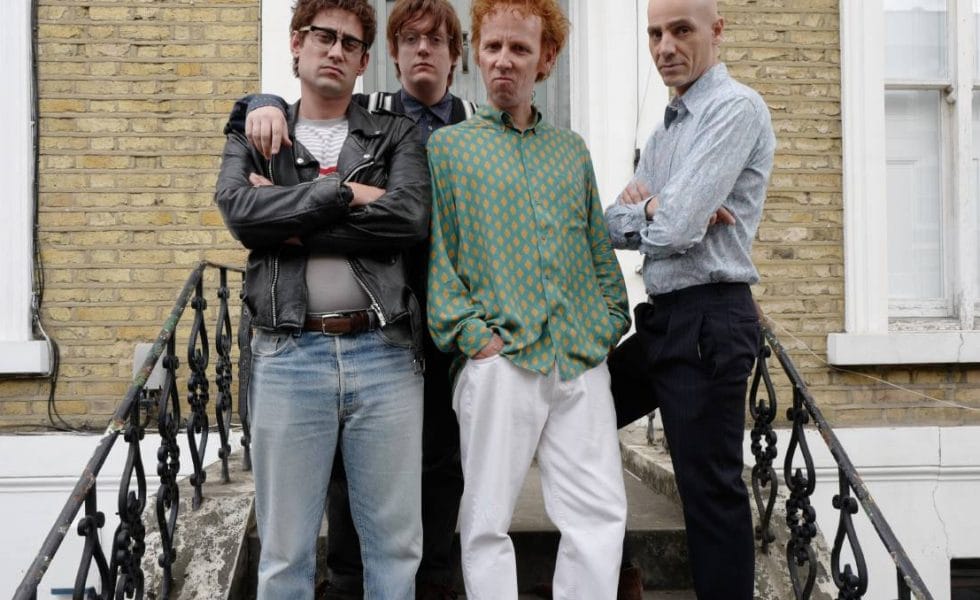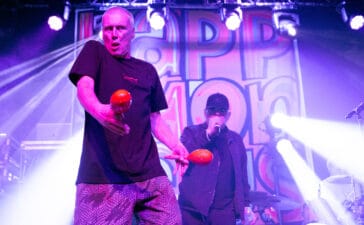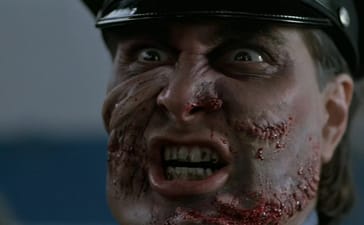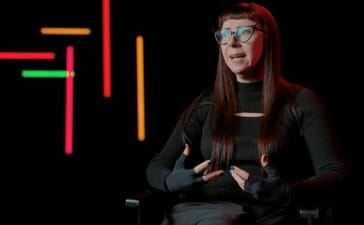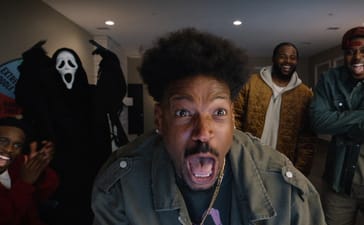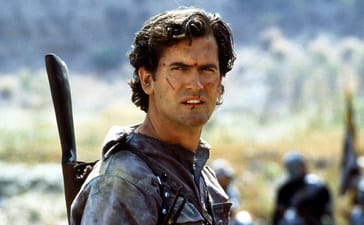Hark to the tale of Alan McGee, self-described “wee ginger tool from Glasgow” and one of the most important figures in the history of, well, at least British music and arguably the global groove diaspora.
Directed by actor-turned-director Nick Moran (Lock, Stock and Two Smoking Barrels) and adapted from McGee’s 2013 autobiography by Dean Cavanagh and Irvine Welsh, Creation Stories follows McGee (here played with charm and vigour by Ewen Bremner) on his journey from slum kid to music mogul and back again – and then back again, what with the real world McGee still being a major music industry player.
It’s pretty rote stuff, really. The ur-example of this kind of fourth-wall-breaking, myth-making, self-deprecating music movie portraiture is Michael Winterbottom’s 24 Hour Party People (2002), which saw Steve Coogan as Factory Records honcho Tony Wilson and charted a similarly haphazard, true-ish course through Manchester’s music scene over roughly the same period Creation Stories covers. Here we get Bremner as McGee, Creation Records instead of Factory Records, and a story that traces similar territory with a less ambitious hand.
Which is a bit of a shame when you look at the impressive pedigree that Creation Stories boasts. Co-writer Irvine Welsh, a friend of McGee’s, wrote Trainspotting (and other things, but let’s face it – Trainspotting, right?), one of BritLit’s most important books of the 20th century and inspiration for one of the best British films of the ‘90s. That film’s director, Danny Boyle, is an executive producer here. Creation Stories star Ewen Bremner was in Trainspotting’s main ensemble. Remember that iconic police line-up poster? He’s the only one whose name you’ve got to glance at in the credits at the bottom.
That’s a bit mean. Bremner is an exemplary character actor and it’s weird that, of the main Trainspotting cast, he’s had the least popular success. Even Kevin McKidd has lapped him, and he’s not on the poster. But Bremner is pretty great here, folks; McGee has said that he knocked back Ewan McGregor as a casting suggestion because he thought the once and future Jedi too handsome, and you have to wonder what Bremner thinks about that. It must be said that Bremner’s more…workaday looks gift the onscreen with more character and pathos than another, less oily casting choice might have. The movie McGee always has the air of someone who’s in way over his head but cannot abide the thought of anyone else knowing that, getting by on bravado and borrowed glamour from the stable of bands beneath him. While younger actor Leo Flanagan plays McGee as a youth when he was trying on his sister’s makeup and trying not to get thumped by his unreconstructed working-class dad, Bremner embodies him throughout the rest of his life, from his leather-jacketed London punk days to his first-class-and-cocaine-debauched decade, taking in several points of interest along the way, primarily the rise of rave culture.
But it’s all a bit surface-level, really, and the main takeaway is that McGee had (and still has, presumably) great taste in music, a keen eye for the next big thing, did a bunch of drugs and met a load of interesting people. And those he didn’t meet he imagined he did anyway; while we get longtime friend Bobby Gillespie (Ciaran Lawless and Joseph Marshall) of Primal Scream, last year’s impresario Malcolm McLaren (director Moran) and, god help us, Tony Blair (James Payton) and Jimmy Saville (Alistair McGowan) in the flesh, we also get a drug-fueled imaginary encounter with occultist Aleister Crowley (Steven Berkoff, clearly enjoying himself). It’s not quite up there with Tony Wilson meeting God and seeing that He looks just like him (or vice versa) but we’ll grade it an A for effort.
While Creation Stories isn’t transgressive, it is amiable, and for some viewers that will be enough. It is, though its target audience will vehemently deny it, an exercise in nostalgia more than anything else; a chance to relive the glory days of going all night on two pingers without having to worry about getting the kids to school on Monday. It’s an interesting contrast with Boyle’s own T2: Trainspotting, which boasts a deep mistrust of nostalgia and instead posits that the good old days were, in fact, shit, no matter how great the soundtrack was.
What’s really striking about Creation Stories is that it posits a version of both the music industry and the drug scene where nobody ever actually gets badly hurt; or if they do, we’re encouraged not to pay them too much attention. Here even rehab is a cozy experience and will lead to a healing of your primal wound: McGee eventually mends fences with his father, who is forced to concede that his wayward son really does have great taste in tunes. Creation Stories is basically the story of someone who got everything he ever wanted and had a pretty good time of it, but as self-serving hagiographies go, at least it’s a fun one.


